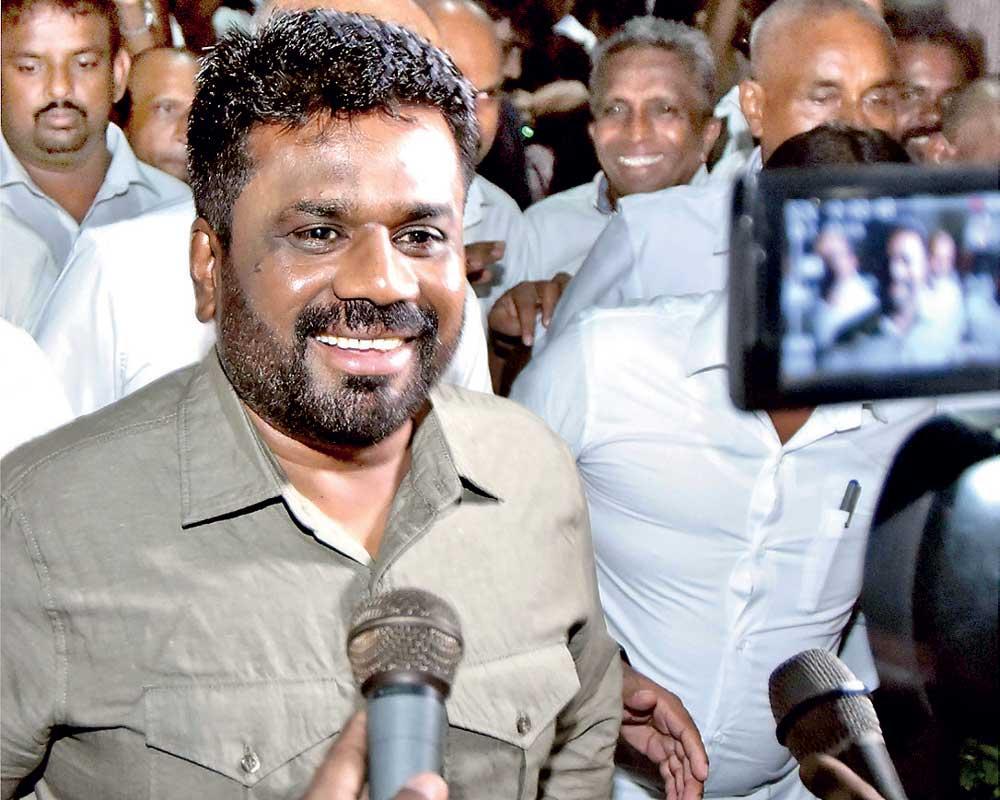Reply To:
Name - Reply Comment
 Anura Kumara Dissanayake ‘all smiles’ as he leaves the People’s Liberation Front Head Office in Battaramulla to the Election Commission.
Anura Kumara Dissanayake ‘all smiles’ as he leaves the People’s Liberation Front Head Office in Battaramulla to the Election Commission.
Pic by Kushan Pathiraja
By Nishel Fernando
Sri Lanka’s capital market is expected to adopt a cautious approach as it anticipates President-elect Anura Kumara Dissanayake’s inaugural speech, with investors seeking clarity on the future policy direction under his leadership.
While a “wait-and-see” sentiment prevails, there is some short-term optimism, as Dissanayake’s leftist win has already been factored into the market, according to analysts.
First Capital Chief Research & Strategy Officer Dimantha Mathew said the stock market is likely to remain in this holding pattern until more information is available.
“There’s likely to be a ‘wait-and-see’ approach in equities tomorrow, but with some optimism. On the other hand, the bond market is expected to be dull,” he noted.
Mathew added that the trend of institutional and high-net-worth investors driving the market upward in recent days is expected to continue, though much will depend on the signals provided in Dissanayake’s first statement.
“From a market perspective, investors are looking for this announcement to signal policy direction,” he explained.
Key factors influencing future market movements will be the upcoming fourth review of Sri Lanka’s IMF programme and the administration’s stance on external debt restructuring (EDR).
Mathew pointed out that depending on negotiations, the IMF could offer additional time to complete the EDR, potentially pushing the process to the next IMF review. This would allow the new government more time to secure the fourth tranche of IMF funding.
“It all depends on how they negotiate,” Mathew said, adding that any revision to the Debt Sustainability Analysis (DSA) would take time and could even require a fresh IMF programme. A new DSA might offer some fiscal breathing room by imposing larger haircuts on creditors, including domestic ones, but this outcome is far from guaranteed, he warned.
Raynal Wickremeratne, Co-Head of Research at Softlogic Stockbrokers, also expressed cautious optimism. He noted that the market had already factored in the likelihood of Dissanayake’s National People’s Power (NPP) party coming to power, as evidenced by market activity in the run-up to the election.
Since then, buying interest from institutional and high-net-worth investors has fueled an upward trend. However, Wickremeratne emphasised the importance of Dissanayake’s inaugural speech in setting the tone for future market movements.
“Some of AKD’s proposals are expenditure-driven, so it will be interesting to see how they plan to finance these measures. Their approach to the interim budget will be key,” he said.
He also highlighted the upcoming monetary policy review, suggesting it would provide an early indication of how the new administration intends to handle policy intervention. Wickremeratne cautioned that while a revised DSA could bring some fiscal relief, there is no guarantee that the IMF would endorse such changes. He also warned of potential ripple effects from any adjustments, which could have a significant impact on the market.
Meanwhile, Mathew remarked that recent comments from Central Bank Governor Nandalal Weerasinghe, confirming his intention to remain in office, have offered some reassurance to investors.